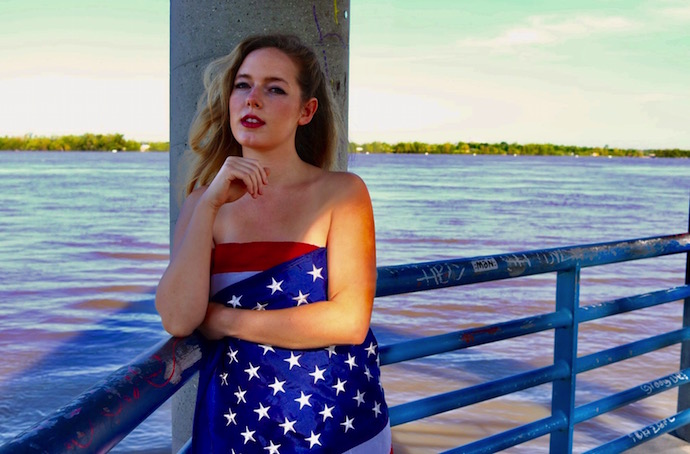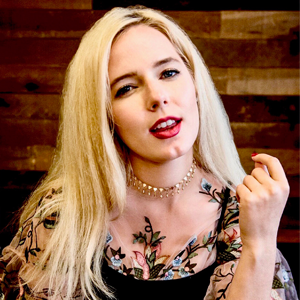They say nothing beats the rush of the first dollar bill hitting your ass in your very first burlesque performance. I wouldn’t know. Somewhere between pummeling the audience with a collection of raw hot dogs I’d strapped to my hip through a g-string, disgustingly devouring a Big Mac and dousing my body in Bud Light whilst gyrating atop an American flag, I kind of blacked out, while my uber-chauvinistic American alter ego took over.
Everyone has their own way of coping with the clusterfuck of tomfoolery that is our current national reality. Kanye has metamorphosed into “New Kanye.” Some dude named Erik Hagermen has gone off the grid. My aunt has started swearing more and using Ayurvedic calming balms.
Personally, I coped by taking to the American highways for an extended road trip, in an “embodied exploration of my national identity.”
After five months of driving from sea to shining sea blasting Lynyrd Skynyrd, grunt-greeting truckers at rest stops with my best cowboy-of-little-words impression, philosophizing to myself in a Russian accent in the privacy of my 2007 Toyota Camry and subsisting on gas station boiled peanuts, I settled back in New Orleans to continue this sojourn in a workshop at Bella Blue’s New Orleans School of Burlesque.

“Burlesque” comes from the Italian word burla, which means to mock, or to parody. The art form, which evades a static definition, is essentially a satirical, theatrical and visually ornate striptease variety show. It is also a dynamic avenue for redefinition: of gender, power, politics, expectations, self-concept, what qualifies as “sexy,” or whatever the fuck else the performer feels like excavating and redefining.
As an industry, burlesque has undergone many redefinitions itself, facing numerous obstacles and run-ins with the law. Originating in Victorian Britain, the bawdy political satire that is American burlesque took form in 1860s New York, during the abolitionist and suffragist movements, as entertainment for delighted throngs of blue-collar men. Since then, its popularity on the live entertainment circuit has swelled during times of economic and political upheaval, and all but disappeared from the general public consciousness during times of national stability.
After a dormant stage in American burlesque, beginning around the 1940s, the neo-burlesque revival emerged in the early 1990s. The neo-burlesque scene continues to grow, and has transcended, though still fully lives on in, the seedy cabarets of New Orleans and the back alleys of Baltimore, to glamorous national venues with headliners like Dita Von Teese. In 2010, Hollywood even came out with the movie Burlesque, starring Christina Aguilera and Cher—a film critics wrote off as “perversely tame.”
What Burlesque the movie and other iterations of the art form sterile enough for Hollywood don’t capture is this new wave of burlesque’s transgressive nature, which is anything but a cookie-cutter showgirl lineup supported by the patronage of the heterosexual male viewer. Burlesque is a platform that showcases performers of all shapes and sizes, gender and sexual orientations. It’s an astoundingly inclusive arena, a subversion of sexual objectification and a cheeky reclamation of power. It’s a “fuck you” with a wink. And, as one of a paltry few women-dominated industries, today’s burlesque shows attract audiences primarily comprised of queer folk and heterosexual women.
But “inclusive” means everyone is welcome, including heterosexual men—and, in the case of my performance as “American Hunny,” the handful of bros who started chanting “U-S-A,” unknowingly spotlighting the subject of my parody and the archetype of my caricature. I couldn’t have planned it better. Thanks, dudes.
With an increased interest in both viewing and performing burlesque since the ‘90s, and especially post-2016 election, the New Orleans School of Burlesque is one of many academies popping up around the country, along with festivals, conferences, and other outlets for performers to convene and share their work, knowledge and skills. The two month workshop I took consisted of weekly lessons, focused on burlesque history, makeup artistry, movement and prop work.
I signed up because it looked like fun, but also because taking off my clothes onstage in front of 150 people was something I was afraid to do, and thus felt important to do. In addition, I’ve always judged myself on a strange scale, by which I will only become a real adult once I’ve performed burlesque, gone to Burning Man and purchased a Vitamix blender. (I am almost two-thirds of the way to real adulthood #burningman2018.) But beyond the lessons, I found the greatest value of the workshop to be the community of all ages, backgrounds, orientations and presentations that formed around a shared desire to challenge ourselves, have fun and uphold the autonomy of doing whatever the fuck we want with our bodies.

My favorite part of burlesque is how it leverages the power tools of suspense and surprise, putting the tease in striptease. As an audience member, the performer keeps you on your toes, and just when you think you’ve gotten your footing, they whip the rug back out from under your feet. Look at this sweet doe-eyed girl having a picnic of assorted phallic vegetables to a soft orchestral soundtrack! Well shit, now she’s getting at the zucchinis with a vegetable peeler in a demonic frenzy. You wanna see her boobs?!? Too fucking bad!! You’ll have to wait.
“More than an unveiling of the performer’s body,” says New Orleans-based burlesque performer Persé Fanny, “burlesque is an unveiling of the performer’s personality.”
Even as the performer lavishly takes off their clothes, they're making fun of their audience for paying to see them take off their clothes. Like a standup comedian who points out their own flaws before and more aptly than anyone else can, the burlesque performer challenges the audience to objectify them as they are already objectifying themselves. You can’t patronize them; they’re already patronizing you. In a moment where reality has rendered most satire redundant, this makes burlesque a particularly potent form of self-expression.
So if you’ve never seen a live show, go do something about that. The renaissance is in full swing, and the fodder for parody is ripe these days. I just saw Ivanka Trump and Kellyanne Conway sing an uncomfortably crude duet last week at The Allways Lounge & Cabaret in New Orleans. If you’ve ever wanted to perform burlesque, I cannot encourage you enough. It’s truly one of the most exhilarating, ridiculous and empowering things I’ve ever done. It’s an incredibly fun way to push through personal barriers, to take a whack at the power structure of your choosing and to “stick it to the man,” even as you are most assuredly not sticking it to the man.
As Oscar Wilde once said, “Everything in the world is about sex except sex. Sex is about power.” Incidentally, I think some crass variation on “Oscar Wilde” would be a pretty good burlesque stage name, should I feel compelled to explore my Irish heritage, naked and onstage. Stay tuned.






